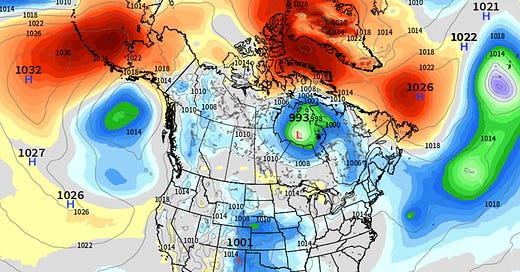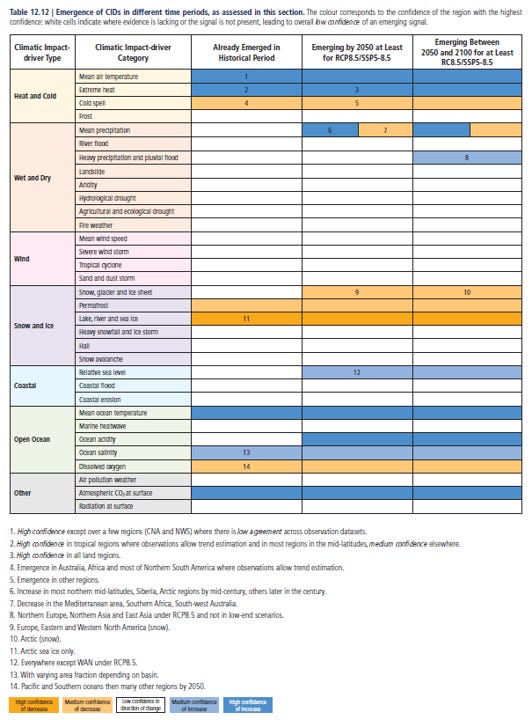
People are going absolutely nuts these days about extreme weather. Every event, any where is now readily associated with climate change and a portent of a climate out of control, apocalyptic even. I’ve long given up hope that the actual science of climate and extreme weather will be fairly reported or discussed in policy — nowadays, climate change is just too seductive and politically expedient.
But for those who want to know what research actually says on the relationship of extreme weather and climate change, that information is readily available. Today I’ll share the excellent work of the Intergovernmental Panel on Climate Change (IPCC) summarizing what its most recent assessment says about various types of extreme weather and climate change.
When you read the below you will realize that the difference between what you see in the news (including statements from leading scientists) and what the IPCC has concluded could not be more different. One day PhD dissertations will be written about our current moment of apocalyptic panic.
Identifying the signal of human caused climate change according to the IPCC, refers to detecting and attributing a change in the statistics of a particular climate or weather variable.
The IPCC further defines the emergence of a signal of climate change :
In this Report emergence of a climate change signal or trend refers to when a change in climate (the ‘signal’) becomes larger than the amplitude of natural or internal variations (defining the ‘noise’).
The IPCC further defines a concept called time of emergence:
Time when a specific anthropogenic signal related to climate change is statistically detected to emerge from the background noise of natural climate variability in a reference period, for a specific region
The “time of emergence” is a key concept of the AR6 report and a focus of its Chapter 12. It is important to note that just because a signal has not been detected, that does not mean that changes are not happening. However, as I have often said, the practical significance of a signal that can’t be detected cannot be large.
Before proceeding — A sidenote, perhaps telling about the state of climate research:
We (Ryan Crompton, John McAneney and I) were among the first to introduce the concept of time of emergence into the academic literature in 2011. The IPCC instead references the concept to a 2012 paper that applied the same concepts and methods, but failed to cite our work. I am used to such things! But it is satisfying to know that our work helped to kick start a major part of the IPCC AR6, which devoted an entire chapter to the topic. Now you know also.
Back to extreme weather — let’s take a look what IPCC AR6 says about the time of emergence for various extreme events. Here are some direct quotes related to specific phenomena:
An increase in heat extremes has emerged or will emerge in the coming three decades in most land regions (high confidence)
There is low confidence in the emergence of heavy precipitation and pluvial and river flood frequency in observations, despite trends that have been found in a few regions
There is low confidence in the emergence of drought frequency in observations, for any type of drought, in all regions.
Observed mean surface wind speed trends are present in many areas, but the emergence of these trends from the interannual natural variability and their attribution to human-induced climate change remains of low confidence due to various factors such as changes in the type and exposure of recording instruments, and their relation to climate change is not established. . . The same limitation also holds for wind extremes (severe storms, tropical cyclones, sand and
dust storms).
The IPCC helpfully provides a summary table for a range of extremes, indicating for various phenomena whether emergence has been achieved with medium or high confidence at three points in time:
to date (today), i.e., specifically when IPCC AR6 was completed in 2021,
by 2050 under RCP8.5/SSP5-8.5, and
by 2100 under RCP8.5/SSP5-8.5.
Those three dates are displayed as the 3 right-most column in the table below.
A white entry in the table means that emergence has not yet been or is not in the future expected to be achieved. The blue and orange entries represent the emergence of respectively increasing and decreasing signals at various levels of confidence.
Take a moment and look at the table carefully. Look especially at all those white cells.
The IPCC has concluded that a signal of climate change has not yet emerged beyond natural variability for the following phenomena:
River floods
Heavy precipitation and pluvial floods
Landslides
Drought (all types)
Severe wind storms
Tropical cyclones
Sand and dust storms
Heavy snowfall and ice storms
Hail
Snow avalanche
Coastal flooding
Marine heat waves
Furthermore, the emergence of a climate change signal is not expected under the extreme RCP8.5 scenario by 2100 for any of these phenomena, except heavy precipitation and pluvial floods and that with only medium confidence. Since we know that RCP8.5 is extreme and implausible, that means that there would even less confidence in emergence under a more plausible upper bound, like RCP4.5
The IPCC concludes that, to date, the signal of climate change has emerged in extreme heat and cold spells. The IPCC states:
An increase in heat extremes has emerged or will emerge in the coming three decades in most land regions (high confidence) (Chapter 11; King et al., 2015; Seneviratne and Hauser, 2020), relative to the pre-industrial period, as found by testing significance of differences in distributions of yearly temperature maxima in simulated 20-year periods. In tropical regions, wherever observed changes can be established with statistical significance, and in most mid-latitude regions, there is high confidence that hot and cold extremes have emerged in the historical period, but only medium confidence elsewhere.
Clearly, with the exception perhaps of only extreme heat, the IPCC is badly out of step with today’s apocalyptic zeitgeist. Maybe that is why no one mentions what the IPCC actually says on extreme events. It may also help to explain why a recent paper that arrives at conclusions perfectly consistent with the IPCC is now being retracted with no claims of error or misconduct.
I’ve done research on climate change and extreme weather for almost 30 years (yowza!). I know the literature and have contributed quite a bit to it. My view is that the IPCC has accurately summarized that literature (if perhaps overlooking some key work, ahem).
I wonder if the IPCC is next in line to be attacked by champions of the apocalyptic zeitgeist. After all, how can science like this co-exist with an end-of-times panic? Something would seem to have to give, right?
I welcome your comments and questions. We always have great discussions here at THB. Please share this with your favorite doomster and ask them if the IPCC got things wrong? As always, please click the little heart sending some good vibes my way, share on your favorite social media, and if you haven’t already please subscribe at any level.





Thanks for providing this information and analysis. Your approach to a reasonable discussion is very much appreciated. I agree with your comment below that using the RCP8.5 makes this table that much more impactful -- as even a result fueled by extraordinary forcing of the model results in no emergence of a signal. Of course to interpret the result, the reader would have to understand what a modeling exercise is trying to achieve by using such extraordinary forcing variables. Unfortunately, I don't think the general public nor the new media will take the time to understand any of this. PLEASE KEEP UP YOUR EFFORTS TO EDUCATE US ALL. I depend on your analysis to keep me sane during these extraordinary times of challenging science based thought processes.
I really appreciate the information and perspective you provide but I am afraid the points you are making are lost on most folks because of the impenetrable jargon associated with climate change in general. “ Emergence of a climate signal “ is just not going to mean anything to most folks including those trying hard to understand